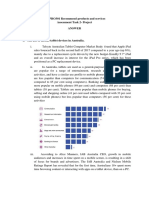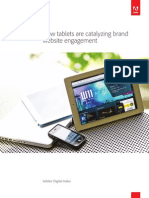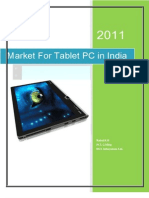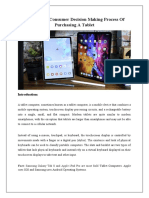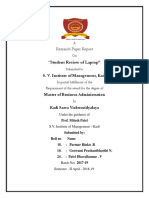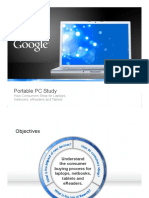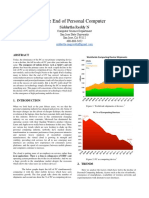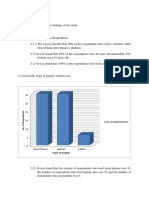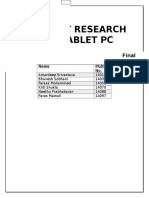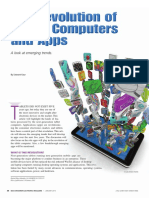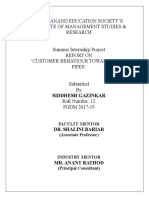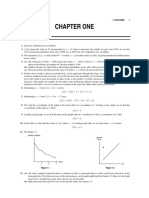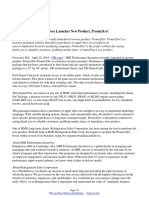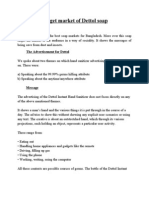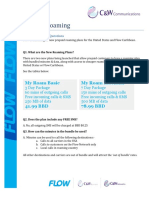Can Tablets replace cellphones and laptops??
Tablets A radical Innovation?
TABLETS
The But
What are they?
first tablet was launched in 2003 (by Microsoft) created a revelation only in 2010 (Apples First i-Pad) known as SMART PC
Also
�RESEARCH OBJECTIVES
To understand the demand pattern of tablet PC vis--vis laptops and smart phones
To study the features expected out of tablets
To understand buying behavior of consumers for tablets, laptops and smart phones. To understand the desirable and undesirable features of tablets To understand the pricing methodology adopted by new players in the tablet markets
�PROBLEM DEFINITION
Problem Statement:
The present study proposes to understand the growing demand pattern for Tablet PCs and its effect on the laptops and smart phones market. The study aims at finding out if the tablets can replace laptops and smart phones owing to extensive features provided by the tablet PC Individuals in the organization The tablet PCs has many features provided by laptops and cell phones, and hence can replace laptops and cell phones. Descriptive Hypothesis
Unit of Analysis: Research Hypothesis :
�Scope
The study can be used by existing players in Tablet industry to better position the tablet The functions which are most sought after will be clear from the study The study will help tablet manufactures to know the functions which working professionals require
�Review Of Literature
�Growth
�Worldwide Market Shares
�Pricing
Among tablet PCs priced between Rs 3,500 and Rs 48,000 are available in market those below the Rs 10,000 price, seem to be a great hit with the consumers. Global vendors like Apple, Samsung, RIM, and Motorola cater to the highend segment of tablet PCs priced between Rs 29,000 to Rs 48,000 Aakash Tablet PC at Rs 3500
�What Drives the Tablet PC Market?
Portability and ease of use
Enterprise mobility Rise in disposable income Burgeoning broadband penetration
Diverse connectivity options
Cheaper as compared to Laptops and PCs
�METHODOLOGY
�Research Design Qualitative
Basic Research
Conclusive Research Descriptive Research
�Variable Analysis
Dependent Independent Moderating Intervening Extraneous
Tablet sales
Tablet Price
Age
Status symbol
Family Income,
Distributio n channel Consumer preference Discounts, Promotion setc. Distributio n network efficiency
Tablet hardware
Profession
�Sampling Design
POPULATION: All the users/potential users of cell phone, laptop and tablet PCs
SAMPLE: The device users divided into 3 strata: Working professionals, Students and others such as businessmen/self employed etc. Sample was a mix of both SAMPLE SIZE: 100 determined based on what was done by other researchers in similar study Probability Sampling: Stratified Random Sampling
� To know what functions people want to perform on a laptop Check if the function can be performed in tablets ; If not can the functionality be added
Information Collected from sample
Use of laptop
Use of cell phone What they dislike about tablets
To know what functions people want to perform on a cellphone Check if the function can be performed in tablets; If not can the functionality be added
To know which feature of tablet is influencing others the most to buy it To know the perception of the product in peoples mind
What they like about tablets
Features the customers are not willing to use a tablet for Which functionality needs improvement
�Data Collection Plan
Secondary data
Sources used were the similar research by industry experts and newspapers
Online questionnaire to the sample elements.
Use of laptop and cell phone Preferred features of tablets Non-preferred features of tablets
Primary research
Characteristics to be measured
Data Observation
Preparation of bar charts and pie charts to observe the collected data
�DATA ANALYSIS
Type of Data : Ordinal
TEST OF HYPOTHESIS Chi Square Test to test independence between sales of tablet and sales of laptops/cellphones
�FINDINGS AND INTERPRETATION
�Primary Research
Survey Respondents
Column1
Student Working Professional 62 % 36 % 2%
�Results : Intended Use of Laptop
100 90 80 70 60 50 40 30 20 10 0 Office Entertainment Internet Business Softwares 88% 51% 90% 95%
�Students: Use of Laptop
24.1% 120 100 80 4% 88.7% 84.6%
60
40 20 0 Office Entertainment Internet Business Softwares
�Working Professionals : Use of Laptop
70 60 50 40 30 20 10 0 Office Entertainment Internet Business softwares 83.33% 83.33% 15.27% 76.4%
�Interpretation:
The results show that:
Students use laptops for Office functions, entertainment (songs,movies,etc) and Internet Business professionals use laptop for Office functions, Internet and Business software Most of the business software require powerful processors and hence require high end laptops which cannot be replaced by tablets
�Results : Intended Use of Cellphone
120 100 80 97% 14% 83% 74% 78%
60
40 20 0 Call & SMS Multimedia Camera Internet Making Documents
�Interpretation:
Cellphone users dont prefer making documents/presentations on cellphones
Other functions are given equal weightage by the users
If these functions are available in tablets, with improved features, people might go for them
�Result : Why Tablet?
90 80 70 60 50 40 83% 12% 50% 19%
30
20 10 0 Portability Size Status Affordability
�Interpretation:
Portability is a major factor why people go for tablets as compared to laptops
Larger size (especially screen size) than cellphones also play a role in customers decision making
Price elasticity of demand must be low as it doesnt play a major role in customer preferences
�Results : For what Not a Tablet? 67% 30% 7% 9% 41%
80 70 60 50 40 30 20 10 0 26%
�Interpretation:
Nearly 2/3rd people do not want to use tablets for calling and messaging, despite of tablets having the facility
Difficult to hold it while talking plays a role
Limited processing power in comparison to laptops also discourage potential users
Making documents using touchscreen is cumbersome for 25%
�Which will you buy among the three?
Given a choice to have one or more devices, which will the consumers go with? This will show us what most people want to buy among the three It will show us are they really substitutable or is a particular product probably nonreplaceable from customers point of view
�Which will you buy?
Given a choice to buy one or more
63 62
60%
57 %
61
60 59
58
57 56
55
54 Tablet Laptop Cellphone
�Interpretation:
Going by the primary research, consumer preferences hardly show a difference when given a choice to buy one or more amongst the three
Tablets are being viewed as a parallel product line altogether
Cellphone which is the most portable and smallest remains the leading choice
�Tablet instead of Laptop and cellphone?
Can tablet be positioned as Laptop + cellphone? Are people willing to go for 1 device instead of 2? Are peoples functional needs , for which they use laptops and cellphones , being satisfied by tablets?
�Tablet = Laptop + Cellphone?
71
29 %
Yes No
�Students Opinion
60 % 40%
Yes No
�Working Professionals Opinion
89%
11 %
Yes No
�Conclusion
Tablets CANNOT replace Laptops and Cellphones together For students tablets can replace laptops but not cell phones For working professionals/businessmen tablets are a parallel device and cannot replace both
�Limitations of the study
Sample consists of urban population and rural population has not been considered because of low penetration level of the product Age group considered is 16 50 ; Students below the age of 16 who may be tablet, laptop or cellphone users are not considered People above 50 who generally are averse to new technology are not considered
�Bibliography
Research Methodology: Concepts and Cases by Deepak Chawla and Neena Sondhi http://www.infoworld.com/t/tablets/windows-8tablets-will-replace-laptops-being-laptops-201541 http://www.businessweek.com/articles/2012-0802/heres-why-tablets-will-replace-the-smartphone
�Thank You

